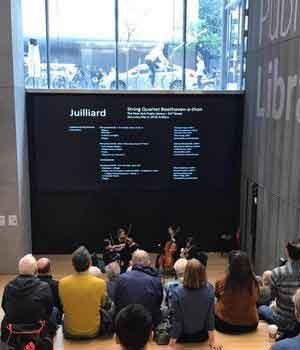
“Beethoven-athon” Concert
All-Beethoven String quartets at N.Y. Public Library
Courtesy: Chener Yuan
Unlike other types of artists (e.g., painters, sculptors, pop song singers, etc.) who create their own works of art and practice unrestricted artistic freedom, we classical musicians seldom compose our own recital pieces; we normally perform existing compositions with musical integrity. By “musical integrity” I mean that it is essential for musicians to be absolutely true and honest to the music when presenting it. It means not merely playing the correct notes with the right timing, it also means careful consideration of what the composer intended.
Nowadays, we seem to think it is inartistic and banal to play music exactly according to the score; some even call playing from the score “robotic” and nothing more than musical “reproduction”. Today’s musicians rely more on their imaginations and ability to improvise rather than adhere to the markings and hints that the composers left for the musician. Although some musical improvisation and creative expression is welcome, this trend toward broad musical interpretation has gone too far in my opinion. I have witnessed musicians doing extreme things that are neither indicated in the score nor convincing enough to be understood as genuine expression. Moderation is key — the freedom of interpretation has to be logical and respect the score and any significant departures from the score should form the basis of a genuine expression of the heart.
So how much creative freedom of interpretation and expression is appropriate? Musical performances need to be touching, expressive, and emotionally fulfilling in order to emotionally resonate with the listener. Otherwise, there is a dichotomy or disconnect between the music and the audience. To what extent can we be free when performing a piece of music? This is a difficult question because music’s boundaries never seem satisfied nor universal. I personally think that freedom relates to every technical and practical aspect of playing. Certainly, honest expressions, performing with integrity, must begin with a serious consideration of what exactly is on the score. Only then can we begin to talk about “freedom” — a creative departure from the score. Furthermore, a genuine creative expression must associate the emotional and personal output of the playing with the technical and practical aspects of playing. The challenge is finding the balance between integrity and the personal.
